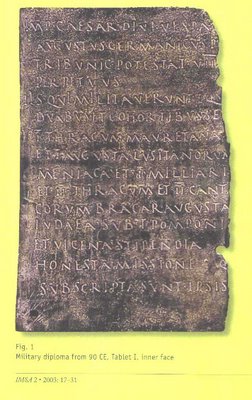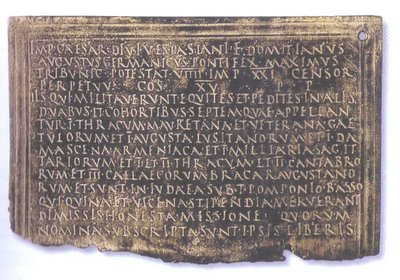Why do we say before Napoleon?
The belatedly departed Edward Said complained about Western writers on Muslim-Arab society who came after Napoleon, as if Napoleon or his military campaigns in Egypt and Israel around 1800 had some determining influence on unfavorable views of this society written by these authors.
Another academic clown, a French "historian" named Henry Laurens, implied in
La Question de Palestine, that the Jews throughout the world had no interest in Jerusalem before Napoleon [who issued an appeal to the Jews in the East to support his forces, promising aid to restore the ancient Jewish state]. In other words, the Jewish interest in the Land of Israel was created by Napoleon. What a gross lie!
Let us then look at exploitation of Jews specifically in Zion, in the city of Jerusalem, before Napoleon. One piece of evidence is from before the Crusades. Another is from the late 18th century, before Napoleon. The Jews were exploited by Muslim-Arab rulers, and this had nothing to do with Napoleon or with the Political Zionist movement founded by Theodore Herzl, who was not born until 1860.
Non-Muslims permitted to live in Muslim states were called
dhimmis. In return for the right to live under Muslim rule, they had to pay special taxes,
jizya and
kharaj, foreshadowed by the Quranic verse, 9:29, which calls on Muslims to fight the unbelievers until they are brought low and pay tribute. Bear in mind, that the non-Muslims were living in the now Muslim lands, Egypt, Israel, Iraq, Syria, Lebanon, etc., before the Arab-Muslim conquest. The non-Muslims represent the indigenous or pre-Islamic population in those countries.
In Jerusalem Muslim-Jewish relations were not all negative at the beginning. Muslim rulers were more tolerant towards Jews in Jerusalem in the Middle Ages than either Byzantine or Crusader rulers, who simply did not allow Jews to live in the city [until the Crusaders were well established and licensed two Jewish dyers, brothers, to live there]. However, Muslim tolerance was relative. Muslim officials and local Arab notables displayed a predatory, exploitative attitude towards the Jewish population in Jerusalem going beyond the precepts of Islamic law, both before and after the Crusades. For the pre-Crusades period we know this from documents that Moshe Gil and other scholars have uncovered in the Cairo Geniza and other sources. These documents tell of the oppression of Jews here. Not only did they have to pay the standard taxes,
jizya and
kharaj, imposed on non-Muslims (
dhimmis) throughout the Islamic domain, but they also suffered the extortion of all sorts of irregular taxes, levies, fines, and bribes.
One Jerusalem Jew, Abraham ben Shlomo ben Yehudah, wrote to a friend in Egypt,
"They eat us alive . . . there are dues imposed on them [the Jews in Jerusalem]. . . and the punishment that they [local Muslim rulers] impose . . . [moneys paid to the governor] of the city and all his functionaries . . . because they are placated [by monetary placating],"
referring to all these exactions. The phrase "placated by monetary placating" is a play on words between Psalms 68:31 and an Arabic phrase somewhat similar in sound and in spelling when the Arabic is written in Hebrew letters.
Another Jew wrote,
"The sons of Kedar [Muslim officials] in Jerusalem and the Land of the Hart [Israel] ... harass a great deal," he complained, "and they grovel for monetary placating . . . Their throats are like an open grave," waiting for money to fall in.
These phrases too echo verses in Psalms (5:10 & 68:31).
The Karaite Jewish author, Salmon ben Yeruhim (middle of 10th century), also complains:
"Groveling for monetary placating, that means that he, Israel, who is (caught up ) among these nations, is downtrodden by monetary placating. He brings the head tax [jizya] and a special tax [that may be required] at any time. And some say: monetary placating means crushed by money . . . that is, crushed by the taking of their money."
About the year 1060, thirty-nine years before the Crusader invasion, a scribe at the Jerusalem yeshiva (Jewish academy), wrote:
"And the regular portions [taxes] and the `onashim [punishments, irregular taxes, exactions] . . . "
Sometimes the Jewish community did not have enough money to pay the amount of taxes demanded. Another Jew wrote about this:
"And when they [Jewish communal officials] gathered it [the tax and other monetary exactions, from the Jews], it wasn't enough to meet the tax that we are obliged to [pay] every year, and we had to borrow the difference . . . "
Yet another letter from Jerusalem Jews written to Jews in Fustat (old Cairo), complained:
"The tax collectors (demanded) one hundred and twenty gold pieces extra . . . And in this year, there was still a difference of thirty gold pieces that we were still obliged to pay . . . And we had to take those gold pieces at interest . . . and when our emissaries came back empty-handed [because they couldn't borrow the money], the creditors (came) and asked to sell the holy utensils. . . " [ כלי קדושה ]
Bear in mind that the manuscripts in which these quotations were found are very old, and sometimes in poor condition. Some words may be unclear or missing.
Note the similarity to the ordeal that NeoPhytos described that was undergone by the Greek Orthodox in Jerusalem in the 1820s (albeit the political situation was different). Even some of the words used are similar. A Jew complains before the Crusades that the Muslim officials' "throats are like an open grave" waiting for money. NeoPhytos writes that the Greek Orthodox in Jerusalem "stuffed their mouths" [of the Muslim notables and officials] with money.
Jacob Barnai has studied account ledgers of the Jewish community in Jerusalem from the second half of the eighteenth century. Here again, despite the passage of time, the picture is similar. The ledgers record, in addition to regular taxes, all sorts of unofficial compulsory payments to Arab-Muslim notables, some of whose descendants are still active as local Arab leaders today. As a sign of their rapacity, Arab creditors burnt down a Jerusalem synagogue in 1720 when a Jewish congregation was unable to pay its debts, driving the congregants from the city. Christians too were, as
dhimmis, sometimes subject to similar treatment. We will come back to Barnai's article in a subsequent post.
Sources: The quotes used here all come from Moshe Gil's article, listed below in both Hebrew original and English translation. Note that we have not always used the published English version, sometimes preferring to make our own translation instead directly from the Hebrew. We also list Barnai's article.
Jacob Barnai, "The Jerusalem Jewish Community, Ottoman Authorities, and Arab Population in the Second Half of the Eighteenth Century," in
Jewish Political Studies Review, Fall 1994.
Moshe Gil, "HaShiltonot vehaOklusiya haMeqomit," in
Sefer Yerushalayim: HaTequfa haMuslimit haQeduma (Jerusalem: Ben Zvi, 1987), p. 85 n.12, 13
Moshe Gil, "The Authorities and the Local Population," in
The History of Jerusalem: The Early Muslim Period, 638-1099 (Jerusalem: Ben Zvi; New York: New York University Press, 1996), p 107, n. 12, 13.





